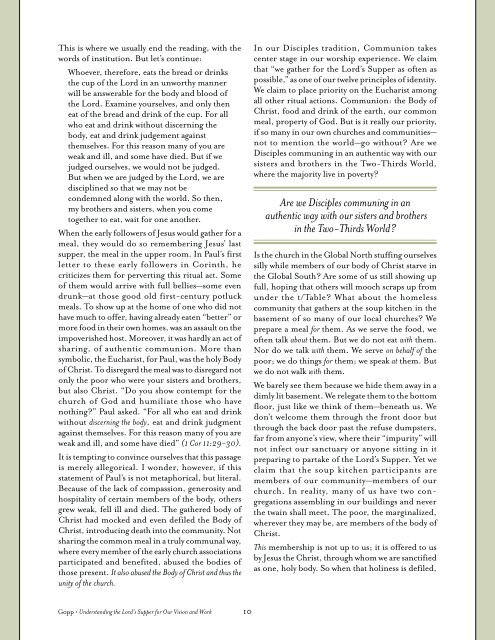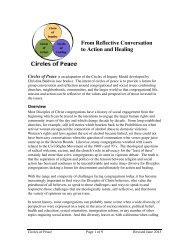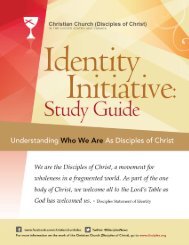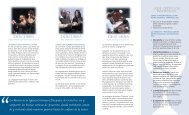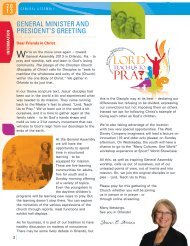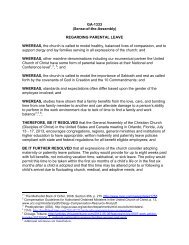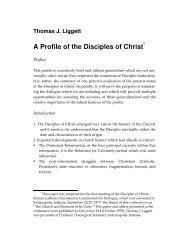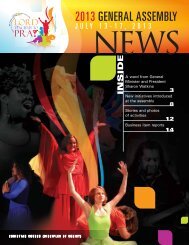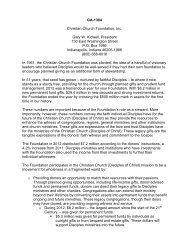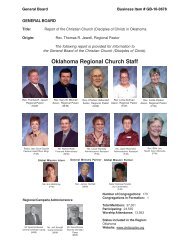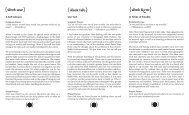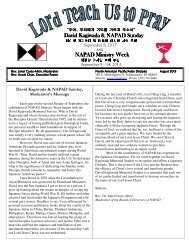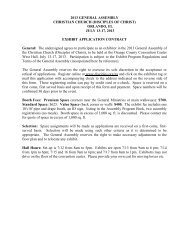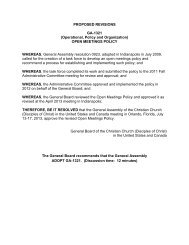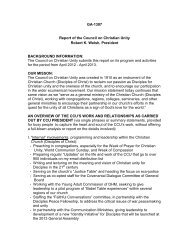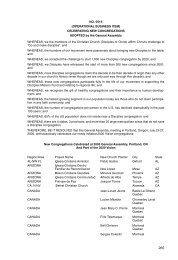RESOURCING THE CHURCH FOR ECUMENICAL MINISTRy A ...
RESOURCING THE CHURCH FOR ECUMENICAL MINISTRy A ...
RESOURCING THE CHURCH FOR ECUMENICAL MINISTRy A ...
Create successful ePaper yourself
Turn your PDF publications into a flip-book with our unique Google optimized e-Paper software.
This is where we usually end the reading, with the<br />
words of institution. But let’s continue:<br />
Whoever, therefore, eats the bread or drinks<br />
the cup of the Lord in an unworthy manner<br />
will be answerable for the body and blood of<br />
the Lord. Examine yourselves, and only then<br />
eat of the bread and drink of the cup. For all<br />
who eat and drink without discerning the<br />
body, eat and drink judgement against<br />
themselves. For this reason many of you are<br />
weak and ill, and some have died. But if we<br />
judged ourselves, we would not be judged.<br />
But when we are judged by the Lord, we are<br />
disciplined so that we may not be<br />
condemned along with the world. So then,<br />
my brothers and sisters, when you come<br />
together to eat, wait for one another.<br />
When the early followers of Jesus would gather for a<br />
meal, they would do so remembering Jesus’ last<br />
supper, the meal in the upper room. In Paul’s first<br />
letter to these early followers in Corinth, he<br />
criticizes them for perverting this ritual act. Some<br />
of them would arrive with full bellies—some even<br />
drunk—at those good old first-century potluck<br />
meals. To show up at the home of one who did not<br />
have much to offer, having already eaten “better” or<br />
more food in their own homes, was an assault on the<br />
impoverished host. Moreover, it was hardly an act of<br />
sharing, of authentic communion. More than<br />
symbolic, the Eucharist, for Paul, was the holy Body<br />
of Christ. To disregard the meal was to disregard not<br />
only the poor who were your sisters and brothers,<br />
but also Christ. “Do you show contempt for the<br />
church of God and humiliate those who have<br />
nothing?” Paul asked. “For all who eat and drink<br />
without discerning the body, eat and drink judgment<br />
against themselves. For this reason many of you are<br />
weak and ill, and some have died” (1 Cor 11:29-30).<br />
It is tempting to convince ourselves that this passage<br />
is merely allegorical. I wonder, however, if this<br />
statement of Paul’s is not metaphorical, but literal.<br />
Because of the lack of compassion, generosity and<br />
hospitality of certain members of the body, others<br />
grew weak, fell ill and died. The gathered body of<br />
Christ had mocked and even defiled the Body of<br />
Christ, introducing death into the community. Not<br />
sharing the common meal in a truly communal way,<br />
where every member of the early church associations<br />
participated and benefited, abused the bodies of<br />
those present. It also abused the Body of Christ and thus the<br />
unity of the church.<br />
Gopp • Understanding the Lord’s Supper for Our Vision and Work<br />
10<br />
In our Disciples tradition, Communion takes<br />
center stage in our worship experience. We claim<br />
that “we gather for the Lord’s Supper as often as<br />
possible,” as one of our twelve principles of identity.<br />
We claim to place priority on the Eucharist among<br />
all other ritual actions. Communion: the Body of<br />
Christ, food and drink of the earth, our common<br />
meal, property of God. But is it really our priority,<br />
if so many in our own churches and communities—<br />
not to mention the world—go without? Are we<br />
Disciples communing in an authentic way with our<br />
sisters and brothers in the Two-Thirds World,<br />
where the majority live in poverty?<br />
Are we Disciples communing in an<br />
authentic way with our sisters and brothers<br />
in the Two-Thirds World?<br />
Is the church in the Global North stuffing ourselves<br />
silly while members of our body of Christ starve in<br />
the Global South? Are some of us still showing up<br />
full, hoping that others will mooch scraps up from<br />
under the t/Table? What about the homeless<br />
community that gathers at the soup kitchen in the<br />
basement of so many of our local churches? We<br />
prepare a meal for them. As we serve the food, we<br />
often talk about them. But we do not eat with them.<br />
Nor do we talk with them. We serve on behalf of the<br />
poor; we do things for them; we speak at them. But<br />
we do not walk with them.<br />
We barely see them because we hide them away in a<br />
dimly lit basement. We relegate them to the bottom<br />
floor, just like we think of them—beneath us. We<br />
don’t welcome them through the front door but<br />
through the back door past the refuse dumpsters,<br />
far from anyone’s view, where their “impurity” will<br />
not infect our sanctuary or anyone sitting in it<br />
preparing to partake of the Lord’s Supper. Yet we<br />
claim that the soup kitchen participants are<br />
members of our community—members of our<br />
church. In reality, many of us have two congregations<br />
assembling in our buildings and never<br />
the twain shall meet. The poor, the marginalized,<br />
wherever they may be, are members of the body of<br />
Christ.<br />
This membership is not up to us; it is offered to us<br />
by Jesus the Christ, through whom we are sanctified<br />
as one, holy body. So when that holiness is defiled,


